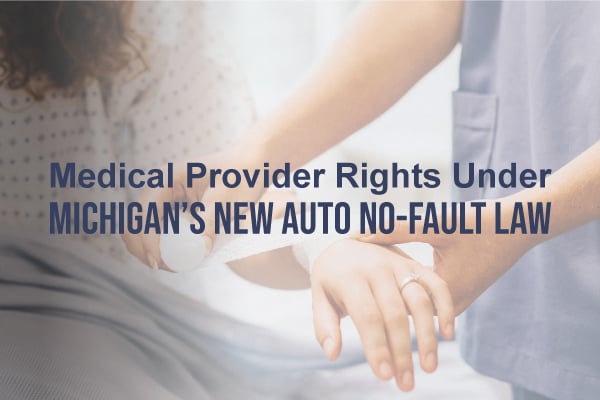Medical Provider Rights Under Michigan’s New Auto No-Fault Law

Tom Sinas, who specializes in Michigan car accident cases, has been going through the many changes to Michigan’s newly reformed Auto No-Fault Law in recent Fox 17 “Know the Law” segments. Recently, he answered a question the firm continues to receive: what are medical provider rights under Michigan’s new auto no-fault law? If you’re a medical provider, this is especially important information for you to know. Patients receiving treatment due to auto accident-related injuries should also understand this change.
Medical Provider Rights Pre-2017
Before 2017, medical providers treating Michigan auto accident victims had a right to sue a patient’s no-fault provider for any outstanding medical bills. In 2017, the Michigan Supreme Court handed down a decision called Covenant Medical Center versus State Farm which held that medical providers did not have a statutory right to sue a no-fault insurer. This decision changed everything.
Covenant’s Impact on Patients
As a result of the Covenant decision, medical providers began obtaining an assignment of benefits from patients in treatment for auto accident-related injuries. An assignment of benefits, once signed, means that the patient assigns the right to the provider to go after the auto no-fault insurer responsible for those bills. Before the 2017 decision, medical providers could go directly to the no-fault provider for payment. Post-2017, medical providers could only pursue payment of benefits via an assignment of benefits from the patient.
Fox 17 Know the Law – Michigan No-Fault Medical Providers Rights
Medical Provider Rights Under Michigan’s New Auto No-Fault Law
One outcome of the massive no-fault overhaul in June of 2019 was the restoration of a medical provider’s right to directly sue the no-fault insurance provider directly. For medical providers handling auto no-fault claims, this means you can now pursue unpaid no-fault benefits directly in the name of your organization instead of via an assignment of benefits from the patient. The public should also know that you’ll likely continue to be asked to sign these assignments of benefits documents. This is because the law has to catch up with the changes, which will likely take a year or so.

